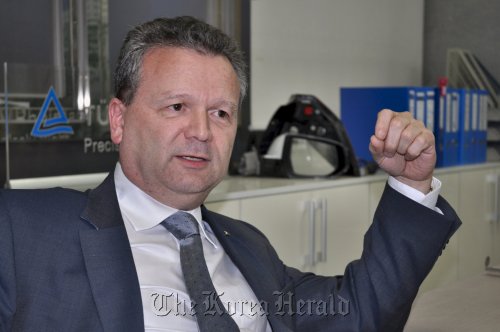For TUV Rheinland, the next step is to progress from being an international company to being a global one.
TUV Rheinland is a leading provider of technical services. They advise, develop, promote, test, inspect and certify products that want to enter into major international markets.
“For us, we connect Korean products with the European and United States markets, South African market. But it’s all about standards,” said chief international officer Stephan Schmitt during a recent visit to Korea.
Becoming a truly global company would mean that a company would be in every important market in the world instead of just a few.
“We want to cover all of it and then we can optimize in a way that we can perform a variety of tests on products and then connect our affiliates,” he told The Korea Herald. “Some countries are difficult, but with our global network we are able to deliver.”
One example he gave is about a Japanese electronics manufacturer that needed access to 120 markets.
In electronics, the delay of a product can cost millions of dollars.
“He couldn’t make progress so he came to us. They were our clients for years but they never thought of us. We were able to deliver the safety certificates in six weeks ―- he was completely beside himself,” Schmitt said.
 |
Stephan Schmitt |
“For us, it’s a question of owning the process, if you own the process, you control the time frame, owning the process means that you have access to affiliated companies in that country of destination,” he said.
By conducting extensive tests and certifying that a product is ready for a market of choice, TUV Rheinland assures a marketing tool that is unmatched in the industry.
From a mother in Europe making sure that a car seat is safe for her child to testing the nuclear fallout in Tokyo, TUV Rheinland is making sure that safety is first.
Their Japanese operations have conducting extensive tests in school and surface contamination measurement for nuclear fallout by the crippled Fukushima Daiichi Nuclear Power Plant.
“We wanted to prove that the students in the Tokyo/Yokohama area are safe and in some areas we just had to wash a little bit directly after the fallout in 3-11,” he said.
Above all, TUV Rheinland is an engineering company that tests for standards, requirements, rules and regulations.
With their experts, they are able to respond to questions their clients have.
“For us, it’s important that we have the capabilities to go to these (nuclear power plant) operators and energy companies and tell them we can help them with the safety requirements of a nuclear power plant,” he said.
On the other hand, renewable energy has become a big player in their business operations.
“We have been pioneering the renewable energy sector and in particular photovoltaic,” Schmitt said.
Even though many governments around the world are offering incentives for solar panels on roofs, deserts and landscapes worldwide, the challenge remains that it is still an expensive source of power.
“The output of harvesting solar energy diminishes over time, so these panels have a certain life expectancy and then we talk about issues like bankability and return of investment,” he said.
“So we do an accelerated life cycle testing and simulate five and 10 years of operation of these panels and see what the output of these panels are. We found significant differences.”
“I truly believe that with the research capabilities that the Koreans have developed, that they have sufficient research done to know what the current plastic composite and polymer materials are and in turn, would allow them to produce the high-end panels,” Schmitt said.
“For us, this is one of the major strategies for the future,” he said. “We have 80 percent of the world market share in testing renewable photovoltaic panels which means we can offer our clients access to all of the markets.”
By Yoav Cerralbo (
yoav@heraldcorp.com)








